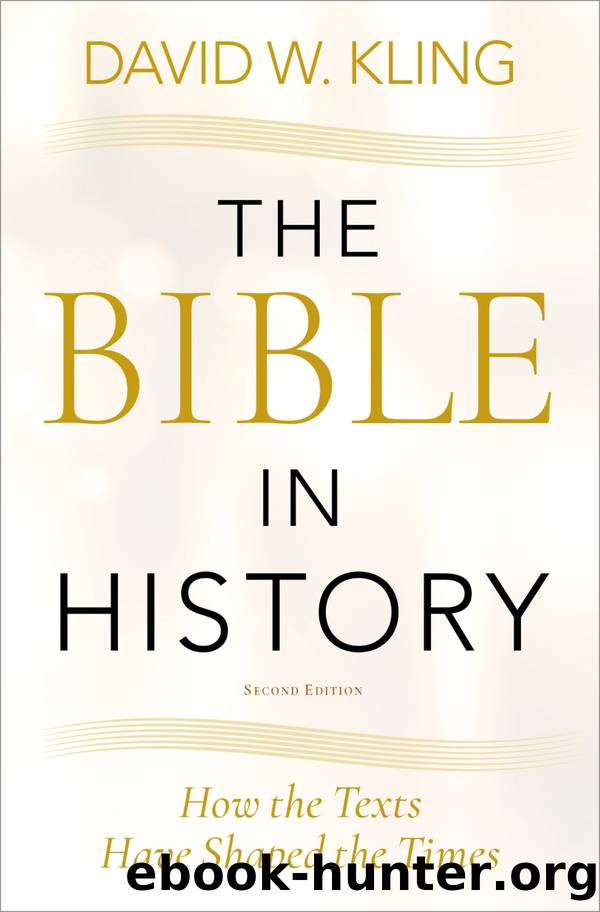The Bible in History by David W. Kling

Author:David W. Kling
Language: eng
Format: epub, pdf
Publisher: Oxford University Press
Published: 2022-06-15T00:00:00+00:00
A hermeneutic constructed around proof-texts is not unique to Pentecostals. Other Christian groups have engaged in a similar hermeneutic of exegeting certain practices from historical or descriptive passages. One could point out that various Christian practices such as baptizing infants, participating in the Lordâs Supper every Sunday, selling oneâs possessions and having all things in common, and the handling of snakes are all derived more from historical precedent than from explicit teaching. But to derive prescriptive teaching from historical narrative is precisely where the criticism has been lodged against the Pentecostal conviction of initial evidence of baptism in the Spirit. There is no indication, argue critics of initial evidence (including even some Pentecostal scholars), that Luke intended to present these examples as models. To so conclude is an invalid inference, for how can one build a doctrine from a few examples?28
As Larry Hurtado, a New Testament scholar and former Pentecostal, understands the matter, Lukeâs association of tongues with Spirit baptism is normal but not the norm; it is a sign of the Spiritâs work but not the sign. âThe authorâs purpose,â he continues, âwas not to provide a basis for formulating how the Spirit is received, but rather it seems to have been to show that the Spirit prompted and accompanied the progress of the gospel at every significant juncture and was the power enabling the work of Christian leaders.â In some cases the author describes specifically how the Spirit was manifested when people received the Holy Spirit (e.g., by speaking in tongues), but in other cases he does not (8:14â19; 9:17â19). The primary intent is to show âthe validity of the gospel developments described,â not âto teach a doctrine of the Spiritâs reception.â In short, the Pentecostal position results âfrom zealous but misguided handling of the biblical data.â29
James Dunn, a prolific New Testament scholar who has carried on a lively running debate with the Pentecostal insistence upon a postconversion experience of the Spirit, expresses another major criticism. In his influential Baptism in the Holy Spirit (1970) and other writings, Dunn argues that for Luke (as for Paul), the real evidence and chief element of Christian experience is the presence of the Spirit in oneâs life, not some kind of distinctively postconversion experience of the Spirit. The New Testament describes the action and work of the Holy Spirit in a variety of ways but none as a second experience that all Christians should seek. Rather, the gift of the Spirit is the essential aspect of the event or process of Christian conversion-initiation. âThe Spirit itself,â notes Dunn, âis the breath of divine life within the believer, the divine action within the human which links and bonds the human with the divine, the dynamic reality of spiritual sonship, without which no one can be said to belong to Christ.â The same holds true of that phrase of initiation, âbaptized in the Spirit.â One must conclude perforce âthat if a theology of âbaptism in the Spiritâ is to be based on NT
Download
This site does not store any files on its server. We only index and link to content provided by other sites. Please contact the content providers to delete copyright contents if any and email us, we'll remove relevant links or contents immediately.
Phoenicians among Others: Why Migrants Mattered in the Ancient Mediterranean by Denise Demetriou(600)
american english file 1 student book 3rd edition by Unknown(599)
Verus Israel: Study of the Relations Between Christians and Jews in the Roman Empire, AD 135-425 by Marcel Simon(589)
Caesar Rules: The Emperor in the Changing Roman World (c. 50 BC â AD 565) by Olivier Hekster(569)
Basic japanese A grammar and workbook by Unknown(566)
Europe, Strategy and Armed Forces by Sven Biscop Jo Coelmont(513)
Give Me Liberty, Seventh Edition by Foner Eric & DuVal Kathleen & McGirr Lisa(491)
Banned in the U.S.A. : A Reference Guide to Book Censorship in Schools and Public Libraries by Herbert N. Foerstel(483)
The Roman World 44 BC-AD 180 by Martin Goodman(473)
Reading Colonial Japan by Mason Michele;Lee Helen;(467)
DS001-THE MAN OF BRONZE by J.R.A(460)
Imperial Rome AD 193 - 284 by Ando Clifford(451)
The Dangerous Life and Ideas of Diogenes the Cynic by Jean-Manuel Roubineau(451)
Introducing Christian Ethics by Samuel Wells and Ben Quash with Rebekah Eklund(448)
The Oxford History of World War II by Richard Overy(446)
Catiline by Henrik Ibsen--Delphi Classics (Illustrated) by Henrik Ibsen(422)
Language Hacking Mandarin by Benny Lewis & Dr. Licheng Gu(408)
Literary Mathematics by Michael Gavin;(407)
Brand by Henrik Ibsen--Delphi Classics (Illustrated) by Henrik Ibsen(386)
